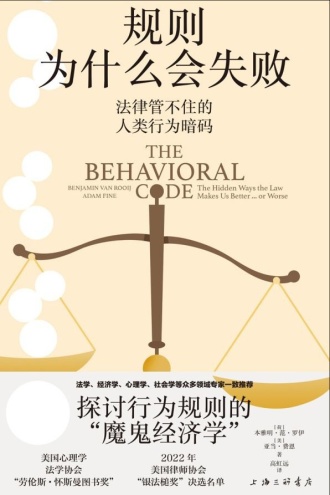
作品简介
探讨行为规则的“魔鬼经济学”
获美国心理学法学协会及美国律师协会奖项
法学、经济学、社会学、心理学等众多领域专家一致推荐
为何系安全带的法规执行良好,而限速规定屡遭突破?竖立“此处禁倒垃圾”标语牌后,此处垃圾为何反而变多?比起法规本身,签名位置更能影响填表人的诚信?机构的安全手册、合规条款和内部举报机制为何形同虚设?严刑峻法反而能鼓励犯罪?……怎样才能避免一厢情愿甚至事与愿违?
失败的规则单有处罚,却不提升安全、产量、环保效果、群体认同……依规律定规则,才是讲科学。人类行为有怎样的客观规律?阅读本书,发现答案。
以法律为例,启迪各种组织规则的设定和执行
公司管理层常用“扣钱”的手段去提振公司效率,克服员工迟到、工作量不达标等问题。警示、处罚等手段固然符合管理者的直觉,但透过本书我们会看到,从法律到幼儿园、公园等共场所的管理规定,此类手段经常失效甚至适得其反。那么变罚为奖是不是更好?也不是这么简单……从中,规则制定者能看到自身的盲点,而规则的被动接受者也可以更为顺应科学规律地趋利避害。
多门社会科学的综合演练
本书综合心理学、经济学、社会学、法学等众多社科研究,指出人类行为的潜藏客观规律,及如何合理利用心理启动,顺应从众效应、不成文社会规范、道德感,综合考虑人们守法和违法的损益等。透过本书,读者可一览在一众社会科学领域中共通的科学思维及实证方法。
丰富案例,有说服力
本书的案例覆盖欧洲、南北美洲、东亚多个国家的刑法、税法、治安法、环保法、交通法规,以及保险政策、公司合规制度、机构安全准则、公园和地铁的规定、公益广告等规则及推行规则的活动中形成的吊诡局面和改善策略及其效果,足可给读者多角度的启发。
[荷]本雅明`范`罗伊(Benjamin van Rooij),中文名刘本,阿姆斯特丹大学及加州大学尔湾分校法学教授,荷中法律研究中心主任、上海交通大学凯原法学院法律与社会研究中心成员、复旦大学司法研究中心境外研究员、云南大学法学院终身客座教授。于荷兰莱顿大学先后获得法学学士、法学硕士、汉学硕士及法学博士学位。其20多年的研究,覆盖工业污染、安全作业、贿赂与腐败、逃税、食品安全等领域。除学术发表外,亦为《纽约时报》《赫芬顿邮报》等刊撰文。
[美]亚当`费恩(Adam Fine),亚利桑那州立大学心理学及刑事学教授,曾受美国司法部、美国心理学基金会资助。研究重点包括人的违法原因、人与法律的关系等。
高虹远,社会学学士,社会学及生物统计学双硕士,现为数据分析师。
Introduction of works
The freakonomics of rules of Conduct
He received awards from the American Psychological Law Association and the American Bar Association
Experts in law, economics, sociology, psychology and many other fields unanimously recommend
Why are seatbelt laws well enforced while speed limits are repeatedly breached? After the placard "No garbage here" was erected, why did the garbage here increase? Does the location of the signature affect the integrity of the person filling the form more than the statute itself? Why are safety manuals, compliance clauses and internal whistleblowing mechanisms not in place? Do harsh laws encourage crime? ... How can we avoid wishful thinking and even counterproductive?
Failed rules have penalties, but do not improve safety, production, environmental protection effects, group identification... To make rules according to laws is to speak science. What are the objective laws of human behavior? Read this book to find out.
Take law as an example to inspire the setting and implementation of various organizational rules
Company management often "deduct money" means to boost the efficiency of the company, to overcome staff late, workload is not up to standard and other problems. Warnings, penalties and the like are certainly in line with managers' intuitions, but as we'll see in this book, from laws to regulations governing common places like kindergartens and parks, they often fail or even backfire. Would it be better to make a fine a prize? It's not that simple... From this, the rule-makers can see their own blind spots, and the passive recipients of the rules can also be more in line with the scientific law to seek advantages and avoid disadvantages.
A comprehensive exercise of multiple social sciences
This book is a comprehensive study of psychology, economics, sociology, law and other social sciences, pointing out the hidden objective laws of human behavior, and how to make rational use of psychological priming, conforming to the crowd effect, unwritten social norms, moral sense, and comprehensive consideration of the benefits and losses of people's law-abiding and law-breaking. Through this book, the reader can see the common scientific thinking and empirical methods in a variety of social science fields.
Rich case, persuasive
The cases of this book cover the criminal law, tax law, security law, environmental law, traffic law of many countries in Europe, North and South America and East Asia, as well as insurance policies, corporate compliance systems, institutional safety guidelines, park and subway regulations, public service advertising rules and other rules formed in the paradoxical situation and improvement strategies and effects of the implementation of rules, enough to enlightens readers from multiple perspectives.
Benjamin van Rooij (Liu Ben), Professor of Law at the University of Amsterdam and the University of California, Irvine, Director of the Dutch-China Law Research Center, Member of the Center for Law and Society, Kaiyuan Law School, Shanghai Jiao Tong University, Overseas Researcher, Judicial Research Center, Fudan University, and tenured visiting Professor, Yunnan University Law School. He received Bachelor of Laws, Master of Laws, Master of Chinese Studies and Doctor of Laws degrees from Leiden University in the Netherlands. His research spans more than 20 years in the areas of industrial pollution, safe operations, bribery and corruption, tax evasion, and food safety. In addition to academic publications, he has also written for the New York Times, Huffington Post and other publications.
Adam Fine is a professor of psychology and criminology at Arizona State University and a former recipient of grants from the U.S. Department of Justice and the American Psychological Foundation. The research focuses on the reasons of people breaking the law and the relationship between people and the law.
Hongyuan Gao, Bachelor of Sociology, double master of Sociology and Biostatistics, is now a data analyst.
 热门标签
热门标签












 书单推荐
书单推荐